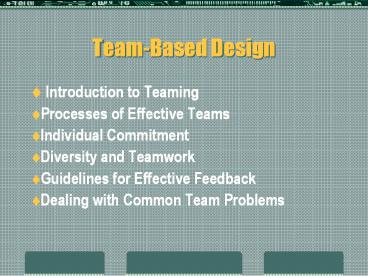Team-Based Design - PowerPoint PPT Presentation
Title:
Team-Based Design
Description:
Guidelines for Effective Feedback ... don t mention it Make it descriptive, not judgmental ... PowerPoint Presentation Author: goodman Last modified by: – PowerPoint PPT presentation
Number of Views:60
Avg rating:3.0/5.0
Title: Team-Based Design
1
Team-Based Design
- Introduction to Teaming
- Processes of Effective Teams
- Individual Commitment
- Diversity and Teamwork
- Guidelines for Effective Feedback
- Dealing with Common Team Problems
2
Introduction to Teaming
- Prominence of teams in workplace
- Self-directed teams
- CQI (continuous quality improvement) teams
- Participative management
- Cross-functional design teams ? (OURS)
3
What is a Team?
- Task Group
- Members depend on each other in some way
- Members must share at least SOME goals
- Collective efforts yield high performance
- Cooperation vs Competition
- Synergism
- Productivity (a b) gt Prod (a) Prod (b)
4
Advantages of Teams
- Motivation team spirit
- Sharing/delegation of workload
- Fast response to change in requirements
- High creativity, good decision-making
- Better cross-functional communication/ find
problems - Learning from each other
5
Problems with Teaming
- Meetings and consensus-building take time
- Poor leadership ? ineffectiveness
- Many people are not good team players
- Differences in effort/commitment ? conflict,
resentment - Hard to communicate between disciplines
- Too much cohesion ? screen out relevant info
6
Learning about Teaming
- Employers really care about your ability to work
in teams - You will gain experience with a team
- You SHOULD reflect on the team process you are
participating in, see how YOU can improve your
skills - Tolerance
7
Principles for Effective Teaming
- Collective decision making
- Collaboration interchangeability (pitching in
with each other) - Appreciation of conflict/differences try to
RESOLVE them, not bury them - Balance of effort
- Focus
- Open communication
- Mutual support
- Team spirit
8
Individual Commitment to Team
- A good team member must be willing to
- Commit time, effort
- Work hard
- Identify with team
- Prioritize team goals relative to your own
9
Diversity in Teams
- Its a benefit more views/expertise available
- Innovative solutions
- Its a curse harder to communicate/feel
cohesive - Conflicts in style, preferences, etc.
- Ideally, want a BALANCE
10
Feedback to Team Members
- Most people dont like to provide feedback, if
not positive - Fear hurting feelings/making enemies
- Even when requested, most may not want to hear it
- BUT
- If ACCURATE and HELPFUL, may be valued, and can
help individual and team - If you cant change things, dont mention it
- Make it descriptive, not judgmental it makes
ME feel, not you are such a
11
Protocol for Feedback Session
- Decide on subject for feedback (scope)--Lets
talk about how we - Start positive, what they should KEEP doing
- Mention what youd like to see people do more or
less of - Teammates should clarify, gently reinforce, avoid
ganging up - Continue feedback to rest of team all get a
chance to give, receive - Some things are best left UNSAID you need to
keep working with your teammates!
12
For RECEIVING Feedback
- Evaluate your performance yourself, first if
they tell you what you know, dont blame them! - Relax, breathe while listening no one will hit!
- Listen carefully, without interrupting
- Ask for examples, but dont dispute
- Acknowledge valid points / their viewpoints
- Sort it out later its just INPUT to you, NOT
revealed truth
13
Normal Problems They CAN be Handled
- Floundering recognize and adapt/decide
- Monopolizing recognize, feed back, correct --
Hang on, lets see what xx and yy think - Personalizing dont blame people for problems
outside their control attack the problem, not
the person - Power struggles recognize, resolve when
WINNING matters, not resolving the issue, its a
problem - Externalizing dont blame the powers that be
for the troubles of the group































